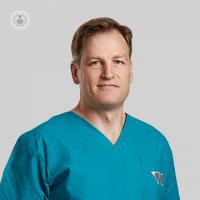Are varicose veins dangerous?
Escrito por:The commonest reason for developing varicose veins is inherited valve defect, which is genetic. This means that there is not much that you could do to prevent it; it is likely that one of your parents had varicose veins and this has been passed on to you.
Less common risks for developing varicose veins are pregnancy, trauma, thrombosis, or weak calf muscles.
Here, Professor Stephen Black, renowned consultant vascular surgeon, explains whether varicose veins are dangerous or not, and what it means if they are painful.

Should you be concerned at all about varicose veins?
Varicose veins appear as blue, purple, bulging veins that swell through the skin.
They may cause symptoms such as:
- swelling
- itching
- throbbing
- restlessness
- aching
- burning
- cramping
- tiredness
- skin discolouration
- hair loss
- ulcer
The development of ulcers is the worst-case scenario as the skin breaks down and healing is very difficult.
If you have no symptoms and there is no cosmetic concern, you don’t have to have treatment, but please be aware that when varicose veins develop they tend to get worse with time.
If you have no symptoms from your varicose veins and they don’t deteriorate rapidly, then there is no rush to seek treatment.
How do varicose veins develop?
The veins normally send the blood from the feet to the heart. To do so, they need to have a strong wall and valves that help push the blood upwards against gravity.
If the valves fail, or the vein wall is very weak, blood goes towards the feet, increasing the venous pressure inside the leg veins. As a result of this high pressure, veins swell and bulge, developing varicose veins.
READ MORE: HOW TO GET RID OF VARICOSE VEINS
What does it mean if your varicose veins are painful?
Usually, the pain is not because of the presence of varicose veins, but rather due to the high venous pressure in the legs. The venous congestion/high pressure down the legs stretches the wall of the veins, and this can be very uncomfortable - especially when standing for long.
Professor Stephen Black is a highly skilled consultant vascular surgeon with over 25 years' experience.
If you need to have your varicose veins checked, do not hesitate to book an appointment with Professor Black via his Top Doctors profile today to receive expert treatment and assessment.


